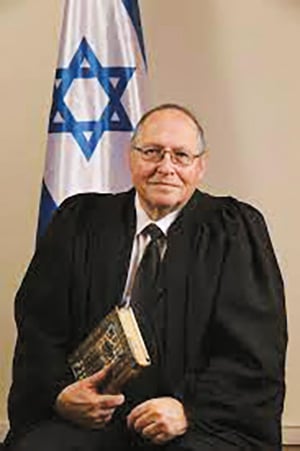
Protestors have taken to the streets in Israel to protest judicial reforms that would broaden the governing coalition’s control over the judicial system, including giving it veto power over the Supreme Court and over the appointment of judges. Currently, judges are appointed by a “Judicial Selection Committee,” which is made up of representatives from multiple branches of government—two government ministers, two Knesset members, three Supreme Court justices—as well as two representatives of the Israel Bar Association, according to the Israel Democracy Institute.
Elyakim Rubinstein, who formerly served as Israeli attorney general and vice president of its Supreme Court, joined those protests and said he hopes President Isaac Herzog can negotiate a compromise to preserve the integrity of the judiciary, noting, “the current idea to basically put it in the hands of the politicians” leaves it open to the whims of political crises and could possibly destroy a legal system that has served the interests of Israel society.
Rubenstein made his remarks during a virtual February 12 Robert and Arlene Rosenberg Touro Talks program co-sponsored by the Jewish Law institute at Touro Law Center.
Touro President Alan Kadish, who was in Jerusalem, said he witnessed the demonstrations and felt the tension in the air. The proposed changes to the legal system have, in a move Kadish termed “very unusual,” drawn a response from U.S. President Joe Biden, who urged a compromise consensus acceptable to much of the population “to ensure that the people buy into [the changes] so they can be sustained.”
Rubenstein was called “an extraordinary judge” because of his deep understanding of both Jewish and secular law in the introduction by Justice Aharaon Barak, who served as Supreme Court president, attorney general and dean of the Hebrew University faculty of law. “Elyakim is my ideal judge,” said Barak. “He continues to reflect our values as a Jewish and democratic state.”
Miriam Marcowitz-Bitton, professor at Bar-Ilan University School of Law and co-editor of the recently published “Elyakim Rubinstein Book,” cited his 50 years as a civil servant and many well-thought-out decisions involving constitutional law and civil cases, including those expanding prisoner rights and other sensitive cases involving Charedi Jews.
“He was always mentioning Jewish law in the cases he was deciding,” said Marcowitz-Bitton.
Rubenstein said the Supreme Court is both the highest court in Israel and the final court of appeals. It consists of 15 justices and two registrars who can hear petitions against government authorities. Although unlike the United States, Israel does not have a formal constitution, Rubinstein said one exists in a functional way. The court’s scope is broad and he compared it to an “Athenian public square” in that anyone can bring a petition before the court.
“The (Israeli) court has been the guardian of human rights,” said Rubenstein, adding, “We bring justice where there has been no justice… we have a strong functioning legal system.” He cited a landmark 2017 ruling that established the right of prisoners to a minimum amount of space in their cells, dubbing them among the weakest parts of the population who don’t lose the right to have humanitarian conditions despite their offenses.
Rubinstein acknowledged that while changing any part of the American Constitution is an arduous and long process, the Israeli system, although different, has handled judicial matters fairly and independently and is well-respected. Rubinstein said that unlike the American court system, which operates under a system of checks and balances among branches of government to prevent overstepping by any, the Israeli court uses as a guide whether a matter is “extremely unreasonable.” The court delves cautiously and rarely into rulings made by religious courts, whether they are Jewish, Christian or Muslim, and only in cases where they “went outside their jurisdiction,” explained Rubenstein.
Rubenstein feared the current proposals would weaken many of those safeguards and dismantle a legal system which had been built up and functioning well for some 70 years.
“We have a clean professional judiciary and I’m not saying we don’t make mistakes,” he noted, but added, “I hope what is being proposed now, God forbid, if it is accepted, will not be the demolition of our legal system.”
By Debra J. Rubin











